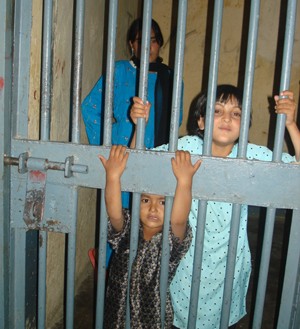Members of Afghanistan parliament accuse some officials of Pul-e-Charkhi prison in Kabul for raping women prisoners.
A delegation of Afghan parliamentarians who recently visited the prison say some women become pregnant after being raped.

The number of children staying with their mothers in Afghan prisons is extremely high, almost equal to the number of their mothers, according to UNODC. (IRIN Photo)
MPs say they are concerned about the conditions of Afghanistan's prisons and are afraid such violations are going on in prisons in the other provinces.
These concerns are stated a day after the Amnesty International report warned about possible abusing of prisoners in Afghanistan.
The findings of parliament delegation suggest that prison officials first give medicines to prisoners to stupefy them and then sexually assault them.
Fouzia Kofi, one of the MPs who meet these victims in the prison, says in some cases victims have been forcibly raped.
Ms. Kofi says: "they (prisoners) say when we are ill and ask for medicines, they gave the medicines to make them unconscious, and then they are sexually abused. In some cases they are forcibly taken to the offices of prison officials, few women have got pregnant."
She says, fearing Afghan traditions and prison officials have made some victims silent, so it is difficult to find out a statistic about the number of abuses.
She says: "the numbers of women who are ready to talk about these issues are few and unfortunately they don’t have the gut to expose the truth. Because when we (the fact-finding delegation) leave the prison, they become defenseless."
The Amnesty International had already warned about torture of prisons in Afghanistan, but the delegation of Afghan parliament believe the situation in the Afghan prisons is worse then what is reflected in the AI report.



